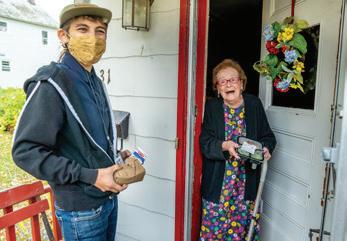
5 minute read
FOOTPRINT CALCULATORS
• EPA (www3.epa.gov/carbon-footprint-calculator) pros: quick, options for carbon reduction and money savings cons: requires fairly detailed data from the user trash and travel.
Each question has suggested averages in case you aren’t able to estimate, and options to be more specific if you have more precise data. At the end, the calculator tells you on what date of this year the Earth would run out of resources if everyone in the world had the same ecological footprint.
UC BERKELEY’S COOL CLIMATE NETWORK
The same is true if we think of our own “carbon footprint,” which is the total impact we leave on the earth from the release of carbon through our use of fossil fuels from all uses including heating, driving vehicles, generating electricity, traveling and disposing of items in the trash.
Climate change mitigation, or how we can reduce the size of our carbon footprint, is often publicized in terms of largescale and often overwhelming solutions such as: decarbonizing the electric grid, switching all vehicles to electric and transitioning to more sustainable agricultural practices.
While these big ideas are all important, changing the climate for the better is ultimately the result of all the actions of billions of individual people across the planet. While this may sound daunting, it also means that as individuals there are steps we can take to lower our carbon footprint and mitigate our negative impact on the climate.
Determining the ranking, and therefore the impact, of a carbon footprint depends on how it is measured: an individual, business, city, state, or an entire country.
For example, within the United States, Vermont is one of the least carbon-intensive states, ranked 45th for per-capita emissions and 50th for total emissions. However, on a per-capita basis, the United States as a whole ranks roughly 16th high -
• Carbonfootprint.com (www.carbonfootprint.com/calculator.aspx) pros: extremely detailed, very involved cons: requires detailed data, comparison “footprints” aren’t very helpful
• Ecological Footprint (www.footprintcalculator.org/home/en) pros: great interface, easy and quick to do cons: hard to interpret the results
• Berkeley (https://coolclimate.berkeley.edu/calculator) pros: easy interface; flexible level of detail
~ Williston Energy Committee est in the world. This means Vermonters still have some of the larger carbon footprints worldwide.
Berkeley’s calculator (https:// coolclimate.berkeley.edu/calculator) looks at travel, home energy use, food, shopping and, in some cases, allows the user to choose a simple approximation or a more detailed breakdown to estimate their carbon emissions. With each change the user makes, a graph updates showing the user how they compare to others. It also has a separate “take action” tab with carbon-reducing actions with their upfront costs and estimated payback per year.
What can you do to reduce the size of your carbon footprint? One of the best places to start is to understand the size of your carbon footprint. Thanks to a variety of free online calculators, it has become increasingly straightforward to determine your carbon footprint. They range in level of detail and accuracy, but all can give you an idea of what changes you can make to reduce your impact on climate change. Here are a few we encourage you to explore and try.
Epa Carbon Footprint Calculator
The EPA’s carbon footprint calculator takes users through three tabs: Home energy, transportation and trash. In each tab, the calculator asks users for specific information. Each tab also gives users an option to explore different ways to reduce their carbon impact and save money, such as switching to LED lightbulbs or recycling glass bottles.
CARBONFOOTPRINT.COM
This calculator is the most involved and best for those who are familiar with their energy consumption by fuel, yearly spend on different types of goods, and can estimate their yearly travel well. At the end, the calculator depicts your country’s average footprint, the global average, and your carbon footprint as three footprint renderings of different sizes. It also allows you the option of showing how your footprint size would change if you offset different types of activities, such as household energy use.
Ecological Footprint
This calculator (www.footprintcalculator.org) has a very user-friendly interface and only takes a few minutes to complete. It steps the user through simple questions about food consumption, sourcing, housing type, family size, electricity source,
While there are many other carbon footprint calculators available for you to try, these four should give you a good idea of how you as an individual or family are impacting the climate and will suggest ways to reduce your carbon footprint.
We can all be responsible stewards of our planet to the benefit of present and future generations. Try out one or more of these tools to measure your carbon footprint. Having that understanding may provide you the inspiration to make small changes in your daily life that collectively could reduce your carbon footprint by a lot.
Reach out to the Williston Energy Committee at energy@ willistonvt.org or attend one of the public meetings, held on the second and fourth Wednesdays of each month. The agenda for upcoming meetings is posted on the Town of Williston website (www.town.williston.vt.us). For more information, visit www. willistonvtenergycommittee.org.
The judges of this year’s Armand Poulin Memorial Green Up Day Poster Art Contest had their work cut out for them. There were 654 pieces of art to evaluate, a record increase from the 200-250 entries that Green Up Vermont usually gets.
“It is fantastic to see student engagement, in all age groups, on the rise. They are genuinely becoming more aware, more concerned and more involved in environmental stewardship,” said Green Up Vermont Executive Director Kate Alberghini.
Art from a Ludlow fifth-grader won the contest and will be featured
The importance of cleaning up our state
I didn’t really think about the environment until it actually impacted me.
I was driving to the city with my dad when I noticed the amount of trash on the side of the road. The city smelled, the ground was dirty, and it was because no one was taking care of the environment.
In Vermont, there’s very few instances where I feel that way. There’s no smell besides the fresh air smell. The ground isn’t littered with trash, it’s littered with plants. If we don’t take care of our environment, our children will have to do it. By then, it’ll be way worse.
When you support our 2023 March for Meals campaign, you can ensure that aging Vermonters can live more healthy, happy and independent lives at home, where they want to be. You can give back by donating, volunteering, or sponsoring a on Green Up Day posters statewide. Other category winners were a Dorset 10th-grader, an eighth-grader from Shelburne and an Underhill fourth-grader. Cash prizes are awarded to each winner.

Green Up Day is Saturday, May 6, when Vermonters from all over the state pick up litter that has been released from the melted snow. For more information or to get involved, visit www.greenupvermont.org.

Green Up Vermont also puts on an essay, jingle and video contest for students. At right is the winning essay, by an eighth-grader from Montpelier.
Global warming, littering, and pollution are serious problems. Even just picking up your trash and sorting it into recycling is helping.
It’s the little actions that matter, they’re small, but mighty. As my mom used to say, ‘If everyone chips in, it’ll make the work easier and faster.’

Our global issues might not go away overnight, but if we start now, it’ll go away faster.
Winning Green Up essay Montpelier eighth grade student









